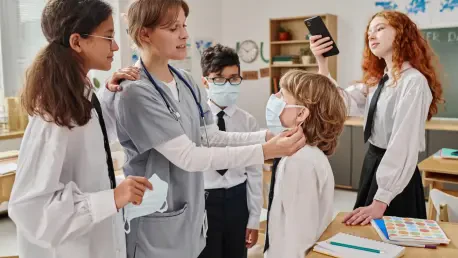The issue of medical care within schools has gained significant attention, underscoring the importance of delineating responsibility. In recent years, a troubling decline in the availability of qualified school nurses has prompted concerns over the handling of medical needs by school staff. Schools Week highlighted the serious risks when unqualified personnel manage delicate medical procedures in educational settings. The downward trend in the number of full-time equivalent school nurses in England underscores this issue, dropping from 3,000 nurses to around 2,000 today. This reality demands a thorough examination of roles and responsibilities within schools regarding the care of students with complex medical needs.
Government’s Role in Developing Guidance
In response to the growing concern, the government has begun developing guidance designed to clarify the roles of school staff in medical contexts. Schools minister Catherine McKinnell has acknowledged the urgent need for clearer guidelines; hence, collaboration is underway with the Department of Health and Social Care and NHS England to formulate non-statutory guidance, set to be released in the autumn. This development aims to address the delegation of medical tasks and ensure effective and safe handling of students’ health needs within educational environments. At an education committee hearing, Helen Hayes brought attention to inadequacies in the current Special Educational Needs and Disabilities (SEND) code of practice, expressing concerns about unqualified staff being delegated medical responsibilities—a scenario deemed unsustainable.
The creation of new guidance arises from debates such as those found in the National Association of Headteachers (NAHT) conference. There, it was highlighted how Department for Education instructions are sometimes misinterpreted, leading schools to feel pressured into executing medical procedures that fall outside their remit. This area of concern further emphasizes the need for clarity, distinguishing between educational and clinical responsibilities. McKinnell has stressed that delineating these responsibilities is crucial for safeguarding both staff and pupils while ensuring the school’s budget is not unfairly overburdened with healthcare costs that should be the Department of Health and Social Care’s responsibility.
Implications of Declining School Nurse Numbers
The declining availability of school nurses and the consequent challenges faced by educational institutions form a critical backdrop to the development of new guidance. School nurses play a pivotal role in managing medical care for vulnerable pupils, providing expertise that cannot be replicated by unqualified staff. This decline in availability forces schools to navigate complex medical needs with less trained personnel, posing risks to both students’ well-being and staff’s legal safety. The reduction from 3,000 to roughly 2,000 nurses has consequently spurred discussions about the necessity of re-evaluating professional responsibilities within schools.
As schools grapple with these challenges, there is an urgent need for well-trained individuals capable of performing medical tasks that ensure student safety. The discrepancy in expertise among school staff further underscores the necessity for clear guidelines on who should handle medical responsibilities. Without proper guidance, schools face potential liability issues concerning inadequate medical care for students, making governmental intervention both timely and vital. Not only does this intervention promise to enhance clarity and safety within educational settings, but it also encourages a reassessment of the resources allocated to school-based healthcare.
Concluding Thoughts and Future Considerations
The topic of medical care within schools has become increasingly critical, highlighting the necessity of clarifying who is accountable. In recent years, there’s been a noticeable decline in the number of qualified school nurses, raising concerns about how medical needs are managed by school staff. This decline poses significant risks, especially when untrained personnel are tasked with handling complex medical procedures in educational environments. Schools Week has drawn attention to the inherent dangers when such situations arise. In England, this concern is magnified by the decrease in full-time equivalent school nurses, which has fallen from approximately 3,000 to about 2,000 today. This reduction demands an urgent and comprehensive review of the roles and responsibilities schools must assume for students with intricate medical needs. It is crucial to develop a robust framework that ensures these needs are met safely and effectively to prevent any potential health risks for students, thereby creating a safe and supportive learning environment.









